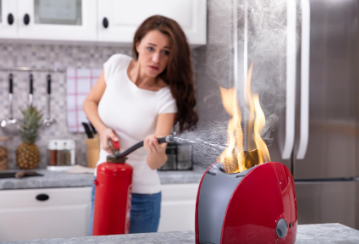News and Updates
6 safety tips to prevent fire or flooding in your kitchen
When kitchen appliances are malfunctioning, neglected or used improperly they can cause a flood or fire, resulting in costly damage to your home and belongings. By learning how these fires and floods can start and following these six safety tips, you can prevent disaster before it strikes.
1. Be vigilant about turning burners off
One in five residential fires start in the kitchen.1 Stoves and range cooktops are the kitchen appliances most often involved in fires—this is where two out of three cooking fires start,1 often the result of user error. Someone could leave a burner on simply by forgetting to turn it off, or by accidentally bumping a front knob. If you have children or large pets, consider purchasing a stove with knobs that are harder to reach or use knob covers.
2. Know what can and cannot go in the microwave
Have leftover bacon from breakfast? Be careful—greasy foods like bacon can ignite quickly in the microwave. Dense vegetable like carrots can also cause a fire when overheated.2 It’s best to reheat these foods in an oven, in a toaster oven or on the stove. And never microwave napkins, paper bags, tin foil, metal cutlery, china with metallic accents, plastic squeeze bottles or styrofoam as they are likely to create a flame.
3. Avoid toasting greasy or sugary foods
A toaster can start a fire if used improperly. If you toast greasy or sugary foods, the grease or sugar can ignite if it touches the heating elements. Avoid stuffing in items that are too big for the toaster as well—they can get stuck or contact the heating elements.
4. Don’t store bleach under your sink
Cleaning products seem to find a natural home under the sink but be careful! Seeping chlorine bleach can be corrosive to the braided hoses that often run under your sink, causing a leak. It’s best to store these harsh cleaning chemicals away from any hoses in case of leaks or spills.
5. Clean your dishwasher regularly
Food particles from your dishes can get stuck in your dishwasher and cause clogs. Thoroughly clean your dishwasher regularly to prevent this. While you’re cleaning, inspect the dishwasher for leaks, cracked hoses and signs that water is getting into the dishwasher door. This way you can spot problem areas before they cause a flood.
6. Keep an eye on your icemaker water supply line
The clear plastic water pipe that often supplies an icemaker can be susceptible to leaks or get damaged when crushed up against a wall. Small pinholes dripping water behind the fridge may go unnoticed but over time can cause hundreds of gallons of water to seep into your floors and wall. Consider replacing a plastic line with a more durable braided steel supply line or inspect the plastic tube regularly for leaks.
It’s important to have the right insurance coverage whether you rent or own your home. Call an OTIP insurance broker today at 1-866-561-5559 to get a quote for home insurance. If you have questions about your current home insurance policy, call 1-800-267-6847.
If you enjoyed reading this article, subscribe to OTIP’s e-communications and you will get more news like this delivered straight to your inbox. Plus, you will be entered for a chance to win a $500 gift card!
1. Origin-and-cause.com
2. Inspection.gc.ca





